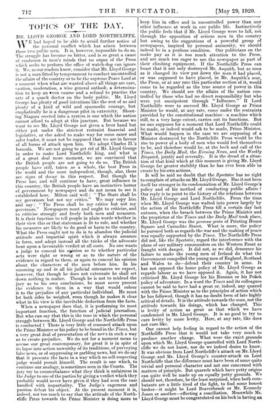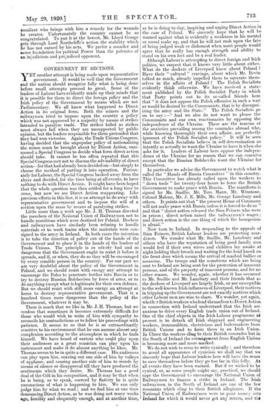TOPICS OF THE DAY.
MR. LLOYD GEORGE AND LORD NORTHCLIFFE.
WE had hoped to be able to avoid further notice of the personal conflict which has arisen between these two public men.' It is, however, impossible to do so. The struggle has become so bitter, and is so great a cause of confusion in men's minds that no organ of the Press which seeks to perform the office of watch-dog can ignore it. We, as our readers know, consider that Mr. Lloyd George is not a man fitted by temperament to conduct uncontrolled the affairs of the country or to be the supreme Peace Lord at a moment when what are wanted above all things are care, caution, moderation, a wise general outlook, a determina- tion to keep an even course and a refusal to practise the arts of a quack doctor on the body politic. Mr. Lloyd George has plenty of good intentions like the rest of us and plenty of a kind of wild and spasmodic courage, but emphatically he is a dangerous pilot in extremity. Shoot- ing Niagara erected into a system is one which the nation cannot afford to adopt at this juncture. But because we want to see Mr. Lloyd George not given a freer hand but either put under the strictest restraint financial and legislative, or else asked to make way for some saner and safer leader, it must not be supposed that we are in favour of all forms of attack upon him. We adopt Charles IL's formula. We are not going to get rid of Mr. Lloyd George in order to make Lord Northcliffe king, and what is of a great deal more moment, we are convinced that the British people are not going to do so. The British people have still, taken as a whole, the best Press in the world and the most independent, though, alas, there are signs of decay in this respect. But though the Press has, and will continue to have, great influence in this country, the British people have an instinctive horror of government by newspaper and do not mean to see it established here. Milton said well : " The State shall be my governors but not my critics." We may copy him and say : " The Press shall be my critics but not my governors." Newspapers must and ought to criticise, and to criticise strongly and freely both men and measures. It is their function to tell people in plain words whether in their view this or that statesman is fit to rule, and whether his measures are likely to do good or harm to the country. What the Press ought not to do is to abandon the judicial attitude and impartial spirit which it always assumes in form, and adopt instead all the tricks of the advocate bent upon a favourable verdict at all costs. No one wants a judge to conceal his opinion as to whether particular acts were right or wrong or as to the nature of the evidence in regard to them, or again to conceal his opinion about the characters of the men before him. In his summing up and in all his judicial utterances we expect, however, that though he does not extenuate he shall set down nothing in malice. Though he is not to mislead the jury as to his own conclusions, he must never present the evidence to them in a way that would colour it to the prejudice of any particular individual. He must let both sides be weighed, even though he makes it clear what in his view is the inevitable deduction from the facts.
When a newspaper does that, it is performing its most important function, the function of judicial journalism. But who can say that this is the tone in which the personal struggle between Mr. Lloyd George and the Northcliffe Press is conducted ? There is very little of reasoned attack upon the Prime Minister or his policy to be found in the Times, but a very great deal of presentation of the news in such a way as to create prejudice. We do not for a moment mean to accuse our great contemporary, for great it is in spite of its lapse into action unworthy of its traditions, of purveying false news, or of suppressing or garbling news, but we do say that it presents the facts in a way which no self-respecting judge would permit himself. The result is one which, to continue our analogy, is sometimes seen in the Courts. The jury try to counterbalance what they think is unfairness in the Judge to one of the parties by giving a verdict which they probably would never have given if they had seen the case handled with impartiality. The Judge's eagerness and passion defeat his object. At the present moment it is, indeed, not too much to say that the attitude of the North- cliffe Press towards the Prime Minister is doing more to keep him in office and in uncontrolled power than any other influence at work in our public life. Instinctively the public feels that if Mr. Lloyd George were to fall, not through the opposition of serious men in the country but owing to the suggestions of a powerful group of newspapers, inspired by personal animosity, we should indeed be in a perilous condition. Our politicians on the make pay as it is too much attention to the Press, and are much too eager to use the newspaper as part of their climbing equipment. If the Northcliffe Press can boast that it not only destroyed Mr. Asquith, but as soon as it changed its view put down the man it had placed, or was supposed to have placed, in Mr. Asquith's seat, the Press, or at any rate this particular section of it, would come to be regarded as the true source of power in this country. We should see the affairs of the nation con- trolled by those who had no direct responsibility but who were yet omnipotent through " Influence." If Lord Northcliffe were to succeed Mr. Lloyd George as Prime Minister he would, at any rate, come under the restraints provided by the constitutional machine—a machine which still, to a very large extent, carries out its functions. But no one supposes for a moment that Lord Northcliffe could be made, or indeed would ask to be made, Prime Minister. What would happen in the case we are supposing of a Minister destroyed by the Northcliffe Press would be the rise to power of a body of men who would feel themselves to be, and therefore would be, at the beck and call of the Times, the Daily Mail, the Evening News, and the Weekly Dispatch, jointly and severally. It is the dread of a situa- tion of that kind which at this moment is giving Mr. Lloyd George far greater stability than he has ever been able to create by his own actions.
It will be said no doubt that the Spectator has no right to complain of attacks on Mr. Lloyd George. Has it not been itself far stronger in its condemnation of Mr. Lloyd George's policy and of his method of conducting public affairs ? Our reply is to point to the history of the relations between Mr. Lloyd George and Lord Northcliffe. From the time when Mr. Lloyd George was wafted into power largely by the action of the Northcliffe Press till a certain day last autumn, when the breach between the Prime Minister and the proprietor of the Times and the Daily Mail took place, Mr. Lloyd George was the persona grata of Printing House Square and Carmelite Street. What is more, the policy he pursued both as regards the war and the making of peace was equally supported by the Times. The Northcliffe Press did not, like the Spectator, regard the interference with the plans of our military commanders on the Western Front as fraught with danger. It did not, as we did, denounce his failure to make the young men of Ireland do what the Government compelled the young men of England, Scotland and Wales to do—defend their country in arms. It has not opposed the home policy of Mr. Lloyd George as regards labour as we have opposed it. Again, it has not criticised Mr. Lloyd George for his Russian or his Polish policy of adventure. In a word the Times and its colleagues cannot be said to have had a great or, indeed, any quarrel with the Prime Minister as to the principles of action which he has followed, though it has no doubt been of late highly critical of details. It is the attitude towards the man, not the attitude towards his doings, which has changed. This is levity of action as great as that which we have condemned in Mr. Lloyd Georae. it is no good to try to cure levity by more levity. °Here, at any rate, like does not cure like.
One cannot help feeling in regard to the action of the Northcliffe Press that it would not take very much to produce another change. What were the exact grounds upon which Mr. Lloyd George quarrelled with Lord North- cliffe we do not know, nor do we indeed desire to know. It was obvious from Lord Northcliffe's attack on Mr. Lloyd George and Mr. Lloyd George's counter-attack on Lord Northcliffe that the difference must have been of some quite trivial and personal character and not one concerned with matters of principle. But quarrels which have petty origins can quite well be made up on equally petty grounds. We should not, therefore, be the least surprised, when both com- batants are a little tired of the fight, to find some honest broker—it might be Lord Beaverbrook or Mr. Kennedy Jones or another—effecting a conciliation. Meanwhile Mr. Lloyd George must be congratulated on his luck in having an assailant who brings with him a remedy for the wounds he creates. Unfortunately the country cannot be so congratulated. To put it at the lowest, Mr. Lloyd George gets through Lord Northcliffe's action the stability which he has not earned by his acts. We prefer a sounder and saner foundation for political Power than the polemics of an injudicious and prejudiced opponent.







































 Previous page
Previous page